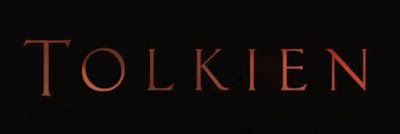Tolkien (Dir Dome Karukoski, 1h 51m)
The biopic, as I've mentioned before, can be a strange beast, especially when focusing upon one of, arguably, the greatest authors of the 20th century. One needs to balance the real life events, especially in the case of Tolkien, set against the battlefields of World War I, with the impact these events have upon his literary creations. Get it right, and you have a film that nimbly mixes the two together, such as 2002's The Hours, in which not only the creation but the legacy of Mrs Dalloway is explored. Get it wrong and you either end up slavish, beholden to the author and the creations, such as Miss Potter, or doing both a disservice, as in the execrable The Man Who Invented Christmas and the equally saccarine Goodbye Christopher Robin in which identikit dial-a-cliche plots are bolted onto Dickens and AA Milne.
Tolkien falls somewhere in between the two. Melding the present of 1917 in which Tolkien searches for a friend at the front during the Battle of the Somme, with a potted history of Tolkien's childhood and school days, and the forming of the fellowship of four school friends, including the young author, the man he is search for, and two other fellow artists, as well as his budding romance with Edith, who he not only later married, but who formed the basis for Tolkien's great heroines, Lúthien and Arwen, it fills in the first three decades of Tolkien's life with broad, if evocative brush-strokes.
This is in no small part due to Nicholas Hoult's portrayal of Tolkien as a sensitive, artistic, passionate, hard working young man, not only merely resting on his close physical resemblance to the author, but inhabiting him fully, best seen in a surprisingly low-key set of scenes in which his drunken declamations in a language of his own invention eventually lead him to his life-long relationship with philology, both as a student and as a professor, and with a surprisingly moving scene of Edith and Tolkien kissing in a corridor after the disappointment of being unable to afford entry to a performance of the Ring Cycle gives way to them listening in and play-acting the opera together.
As for Edith, and the fellowship of friends around Tolkien, there is not only a great sense of two of J.R.R. Tolkien's great themes-fellowship and love- beginning to form, but also the growth of Tolkien the person. There is a particular warmth in his relationship with Edith, (Lily Collins), not only in their dual attempts to escape the stigma of poverty and being an orphan, but in their shared passion for creativity, art, and eventually in each other, with Collins giving Edith both an ethereal quality and a drive to her to match Tolkien.
Tolkien's brotherhood of friends, eventually dubbed the T.C.B.S, a group of fellow students at King Edward's School who set their minds to changing the world through their creative pursuits, are given equal development, (played by Anthony Boyle, Patrick Gibson and Tom Glynn-Carney), and the development of them from squabbling schoolboys to artistic sparring partners, a group of artistic peers who have a close camaraderie with each other, even as the shadow of war falls across Europe, and threatens to break their group forever.
Tolkien's focus on Tolkien the man is, undoubtedly excellent. Aside from moving a couple of key events-most notably the marriage of Tolkien and Edith is moved to post-war, whereas it took place pre-war, and indeed pushes back his first approaches to the world of Middle Earth from shortly after World War I, in what would eventually become known as until the mid 1930s, when, with a certain inevitability he sits down at his desk during paper marking and jots down one of the most famous opening lines in literature, with which the film somewhat triumphantly closes.
The problem is that the closer the film gets to Tolkien's legendum, as his estate, distancing itself from this film, now dub it, the less interesting it gets. There are, indeed, a number of scenes, largely set at the Somme, that juxtapose, somewhat clumsily, Black Riders, a dragon and even the spectral form of Sauron himself in the mud and violence of the front, in a rather childish and overly heavy-handed way, whereas the rest of the film is occasionally peppered with callbacks, allusions and connections to Tolkien's later work that, ironically sadly undermine the drama of Tolkien's early life, and how these formative experiences shaped his work.
Nevertheless, when it focuses upon Tolkien's life and experiences, Tolkien is a well-crafted biopic of the formative experiences and early life of one of literature's greats-one only wishes that it had stayed on these experiences, or more fully integrated the fantastical elements, rather than the strangely clumsy Lord of the Rings callbacks that we're given-as it is, it's a strangely lopsided portrait, more interested in the work than the man behind it.
Rating: Recommended



Comments
Post a Comment